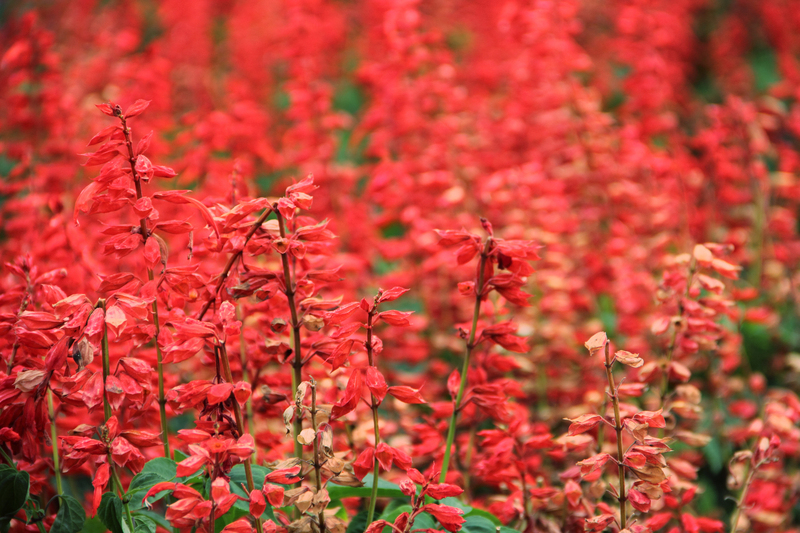Struggling with Weeds? Here Are 3 Tips to Help
Posted on 18/08/2025
Struggling with Weeds? Here Are 3 Tips to Help
Are you battling a relentless army of weeds in your garden or lawn? You're not alone! Many homeowners and gardeners find themselves struggling with weeds that seem to pop up no matter how much effort they put in. Luckily, there are proven strategies and practical steps that can help you reclaim your space and enjoy a weed-free environment.
In this comprehensive guide, we'll share 3 effective tips to help control weeds, boost the health of your plants, and keep your landscape in prime condition. Whether you're a hobbyist gardener or simply want a neatly manicured lawn, these weed management strategies will make a significant difference.
Understanding Why You're Struggling with Weeds
Before diving into the solutions, it's crucial to understand why weeds flourish in the first place. Weeds are opportunistic plants that thrive in disturbed soils, bare patches, and areas where desired vegetation is weak. They compete for resources, such as sunlight, water, and nutrients, often outpacing your favorite flowers, vegetables, or turfgrass.
Common reasons for persistent weed problems:
- Disturbed or poorly maintained soil that exposes bare ground
- Overwatering or underwatering which weakens desirable plants
- Lack of mulch or ground cover to suppress weed seed germination
- Improper mowing or lawn care techniques
- Introduction of weeds through seeds or contaminated compost
Now that you know why weeds might be winning the battle, it's time to take back control. Here are our top three tips for managing weeds and preventing future outbreaks.

Tip 1: Build a Robust Mulching Routine
Why Mulching Is Essential
Mulch is the gardener's first line of defense against stubborn weeds. Mulching works by blocking sunlight, smothering weed seeds before they have a chance to sprout. It also helps conserve soil moisture, regulate temperature, and improve soil health as it breaks down.
How to Mulch Effectively
- Choose the Right Mulch for Your Garden
- Organic mulches (such as shredded bark, straw, grass clippings, and compost) not only fight weeds but also release nutrients as they break down.
- Inorganic mulches (like landscape fabric, stones, or gravel) provide long-lasting weed suppression, especially in perennial beds and pathways.
- Apply Mulch at the Proper Thickness
- Spread mulch in a layer at least 2-3 inches thick. Too thin, and weed seeds may slip through; too thick, and you may suffocate plant roots.
- Replenish Mulch Regularly
- Organic mulches decompose over time. Replenish as needed to maintain effective coverage and keep weeds at bay year-round.
Benefits of Mulching to Solve Weed Struggles
- Suppresses weed growth
- Retains moisture in the soil for healthier plants
- Improves soil structure and encourages beneficial soil organisms
- Regulates soil temperature, protecting plant roots from extreme heat or cold
If you're struggling with weeds in your garden beds or under trees, mulching is an easy and highly effective solution. Remember to keep mulch a few inches away from plant stems and trunks to avoid rot and pest issues.
Tip 2: Perfect Your Hand-Weeding & Removal Techniques
Hand-Weeding: The Classic and Eco-Friendly Approach
While it might seem tedious, hand-weeding is still one of the most effective ways to manage weeds, especially for smaller plots, landscaping beds, or newly emerging weeds. Removing weeds by the root prevents them from resprouting and spreading further.
Best Practices for Hand-Weeding
- Weed after rainfall or watering - moist soil makes it easier to pull up entire roots, reducing the chance of regrowth.
- Use the right tools - invest in a hand fork, hoe, or dandelion weeder to get deep-rooted weeds out cleanly.
- Target young weeds - remove them early before they set seed and multiply.
- Consistent visits - set aside time each week to patrol your garden and remove intruders.
- Bag and dispose of weeds that have gone to seed to prevent further spreading.
Other Physical Weed Removal Methods
- Hoeing -- Useful in large vegetable patches and for slicing weed tops below the soil surface.
- Solarization -- Covering soil with clear plastic in the summer to bake and kill weed seeds.
- Flame weeding -- Using specialized torches to burn weeds (suitable for driveways and paths).
Remember: The sooner and more thoroughly you get weeds out, the less you'll struggle in the future. Don't let a few missed weeds ruin your hard work--consistency is key!
Tip 3: Cultivate a Dense, Healthy Lawn or Garden
The Secret to Outcompeting Weeds
One of the most effective ways to prevent weeds in the long run is to maintain a vigorous, healthy lawn or plant community. Weeds capitalize on weak, patchy areas, so your best defense is a dense cover that leaves little space for invaders.
How to Promote a Thriving Garden or Lawn
- Seed or Reseed Bare Patches
- Don't leave soil exposed. Over-seeding lawns or planting ground covers in garden beds can smother potential weeds.
- Feed and Water Properly
- Adequate fertilization and proper irrigation build strong root systems and vigorous growth.
- Practice Appropriate Mowing Heights
- Mow grass a bit taller (usually 3-4 inches for most varieties), which shades the soil and prevents weed seeds from taking hold.
- Diversify Plantings
- A variety of plants in beds and borders crowds out unwanted species and increases resistance to weed invasions.
- Rotate Crops Annually
- In vegetable gardens, crop rotation disrupts the life cycle of many weeds and pests.
Why Thick, Healthy Growth Matters in Weed Control
- Suppresses sunlight from reaching weed seeds
- Creates competition for resources so weeds can't establish
- Reduces gaps and bare soil where weeds thrive
If you're struggling with weeds year after year, it may be time to focus on boosting the health and density of your lawn or flowerbeds.
Additional Pro Tips for Long-Term Weed Management
- Inspect new plants and soil amendments for weed seeds before bringing them onto your property.
- Edge garden beds to prevent lawn grass and weed encroachment.
- Use pre-emergent herbicides in early spring if you have severe infestations (always follow label directions).
- Don't let weeds go to seed! Even a single neglected plant can result in thousands of seeds in the soil for next year.
Common Types of Weeds You Might Encounter
Understanding the enemy is crucial. Here are a few common weed types you might be struggling with:
- Annual weeds (e.g., crabgrass, chickweed) -- complete their lifecycle in one season. Target these early before they set seed.
- Perennial weeds (e.g., dandelion, bindweed) -- return year after year, often from deep root systems. Persistence is essential to get rid of these weeds.
- Biennial weeds (e.g., burdock, wild carrot) -- take two years to flower and seed. Removal before flowering is key.
Proper identification can help you choose the most effective removal method for each type.
The Environmental Impact of Weed Control
When struggling with weeds, some gardeners reach for chemical herbicides without considering the environmental effects. Prioritize eco-friendly, manual, and cultural approaches first.
- Physical and cultural controls reduce reliance on chemicals and protect pollinators, soil organisms, and water quality.
- If chemical control is necessary, spot treat only and always follow safety instructions.
Together, responsible weed control methods ensure a safer, healthier yard for your family, pets, and local wildlife.

Frequently Asked Questions: Struggling with Weeds
How often should I weed my garden or lawn?
Regularly! Weekly inspections prevent weeds from establishing and going to seed.
Is it possible to eliminate weeds completely?
No garden or lawn will ever be 100% weed-free, but with diligent care and the tips provided here, you can minimize their impact and enjoy a beautiful landscape.
Are there any natural weed killers that really work?
Hand-pulling, mulching, boiling water, and targeted vinegar sprays can help with certain weeds. However, persistence and preventative measures are most effective for long-term control.
Conclusion: Winning the War Against Weeds
Struggling with weeds doesn't have to overshadow your gardening passion or spoil your beautiful lawn. By prioritizing preventative strategies like mulching, consistent hand-weeding, and cultivating thick, vigorous vegetation, you'll dramatically reduce weed problems and maintain a thriving outdoor space.
Remember: It's not about a single battle, but an ongoing strategy. With these actionable, eco-friendly tips, you can finally stop struggling with weeds and start enjoying the lush, inviting landscape you deserve. Commit to these three core principles, and weeds won't stand a chance!



